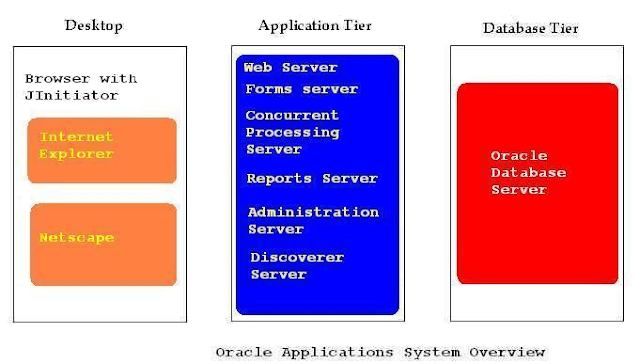Oracle Applications 11i eBusiness Suite (Oracle ERP) use the
n-tier architecture (the architecture made for the web). This architecture can
be seen on the following graphic:
Oracle Applications 11i eBusiness Suite (Oracle ERP) use the
n-tier architecture. Here are the explications:
Desktop tier :
A client could access the Oracle
Applications only by using a Web Browser which must have Oracle JInitiator
installed on it. Oracle JInitiator is the Oracle Java Virtual Machine used to
run Oracle Forms applets.
Application (or
middle) tier includes
·
Web
Server: listens for HTTP requests
and provides an HTTP response to the client. The HTTP response usually consists
of an HTML document, but can also be a raw file, an image or some other type of
document (defined by MIME-types);
·
Concurrent
Processing Server: server which run
reporting programs and data updating programs (periodically or ad hoc). These
programs (named concurrent programs) run on this server in background in order
not to interfere with the normal operations. When a request is made a row is
inserted into FND_CONCURRENT_REQUEST table. The concurrent managers read these
requests in the table and start the relevant concurrent programs;
·
Administration
Server: contains scripts which are
used to administer the Oracle Applications eBusiness Suite. From this server
the following operations can be performed:
1.
Applying patches (using adpatch);
2.
Maintaining Oracle Applications (using adadmin);
3.
Upgrading Oracle Applications from an earlier
release to 11.5.x (using adaimgr);
·
Forms
server: includes the Forms listener
and the Forms Runtime Engine. The Forms Runtime Engine maintains a connection
to the database on behalf of the Java client. It uses the same Forms, Menus,
and Libraries files that are used for running in client/server mode. No
application code changes are required to deploy a legacy client/server
application to the Internet;
·
Reports
Server: run Oracle Applications
reports and is always installed on the same node as the Concurrent Processing
Server. However the reports are administered separately from the concurrent
processing reports;
- Discoverer Server (optional): is installed if Oracle Discoverer will be used.
Database tier :
The Database tier contains the
Oracle Database Server which store all the data needed by Oracle Applications.
The database store the Oracle Applications online help as well. The database
server communicates with middle tier and does not communicate directly with the
desktop tier.

No comments:
Post a Comment